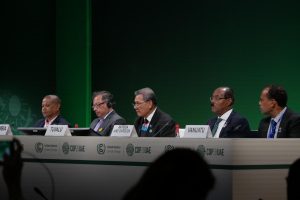The conclusion of COP28 is looming, and formal negotiations are growing to deafening levels, reaching for the sought-after big finish. But some states are content to wait on the official talks. A Fossil Fuel Non-Proliferation Treaty, in large part led by Pacific Island countries, is gaining momentum on the sidelines. Nauru and Samoa are the latest to join the treaty.
With heads of state flying out of Dubai, it will be up to their ministers and envoys to negotiate the final outcomes. These coming days will make or break the conference in the eyes of many, and pressure to “land” COP28 is mounting.
Reference to the role of fossil fuels in the outcome documents of this year’s COP are front and center, with the most contentious debate focused on the nuance between phase out and phase down. The one-word distinction is so important it infamously caused COP26 President Alok Sharma to fight back tears as he apologized for failing to include a “phase out of coal” from the COP26 final text.
With the world media closely following the outcome documents of COP28, it might be easy to miss a rising coalition of countries, mainly from the Pacific nations, calling for a Fossil Fuel Non-Proliferation Treaty.
The treaty is gaining significant international status, with 10 countries signing up this year – and four deciding to join at COP28. Nauru and Samoa will not be the last to join, say treaty campaigners.
The fast-growing coalition is exerting considerable pressure on negotiations here at COP28. “Nauru would like to use this opportunity to join others in calling for a treaty to phase out fossil fuel production” said Reagan Moses, secretary for climate change of Nauru.
Vanuatu’s Minister for Climate Change Ralph Regenvanu said, “This announcement is a significant milestone in our collective journey towards a sustainable and resilient future. The Pacific region has long been at the forefront of climate advocacy, facing the harsh realities of climate change.”
I spoke with Tzeporah Berman, chair and founder of the Fossil Fuel Non-Proliferation Treaty, after Samoa’s announcement. She called the raft of signatories “astonishing, it gave us the sense of momentum… We walked into COP26 with one country, and now we have 11.” Since then, the count has actually risen to 12, further proving her point.
The Fossil Fuel Treaty’s signatories include Vanuatu, Tuvalu, Fiji, Solomon Islands, Tonga, Niue, Timor-Leste, Antigua and Barbuda, Palau, Colombia, Samoa, and Nauru. The treaty is also widely supported by non-government groups, including the World Health Organization and the European Parliament, as well as many academics and NGOs.
According to campaigners, the treaty is inspired by the 1970s Nuclear Non-Proliferation Treaty (NPT) that sought to limit the proliferation of nuclear weapons. In a similar way, the Fossil Fuel Treaty seeks to establish and construct a negative normative context around fossil fuels.
According to Berman, “This is not just about modelling and numbers/ Countries follow each other, they open up political space for each other. Courage is contagious… And that gives license to other countries to follow suit.”
She is particularly hoping to make inroads in Southeast Asia. “The fossil fuel industry and the big banks are trying to make Southeast Asia their gas station, but that is not a long-term economic pathway. And what a lot of countries there are realizing is that if they want to build an economic pathway that is in line with their climate goals, they need new tools, so we have seen a lot of interest [in the Fossil Fuel Treaty] here.”
Oil, gas, and coal account for over 75 percent of global greenhouse gas emissions and efforts to limit these emissions are at the core of deliberations at any climate conference.
The Fossil Fuel Treaty is at an inflection point, making significant strides this year, but how long this momentum will last is an unknown. Regardless, frustration over the processes inherent to the U.N. Framework Convention on Climate Change, particularly the need for consensus, will push more countries to consider novel mechanisms like this treaty.

































